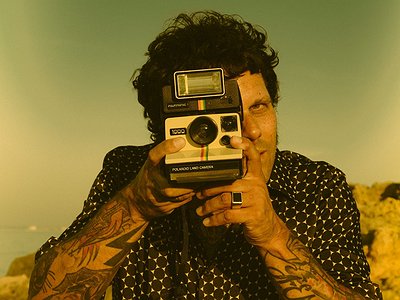Name: Frank Popp Ensemble
Members: Frank Popp, Jascha Kreft
Interviewee: Frank Popp
Nationality: German
Recent release: Frank Popp Ensemble's Shifting is out via Unique.
If you enjoyed this interview with Frank Popp and would like to stay up to date with the music of his ensemble, visit him on Instagram.
Where does the impulse to create something come from for you? What role do often-quoted sources of inspiration like dreams, other forms of art, personal relationships, politics etc play?
Actually for Shifting a lot of situations and conditions during the past three years were in my head when writing the songs. Those are rather rooted in politics and society than in personal relations to people.
Musicwise the shift in the way of recording and the whole surrounding while composing the songs made a big impact on the music as well.
For you to get started, do there need to be concrete ideas – or what some have called a 'visualisation' of the finished work? What does the balance between planning and chance look like for you?
No, mostly it's just a little piece that gets me started, which in the end doesn't seem to have a big relevance in the song, because when Jascha and me worked on the music it was a lot of chance and experimenting with ideas.
Is there a preparation phase for your process? Do you require your tools to be laid out in a particular way, for example, do you need to do 'research' or create 'early versions'?
No, never.
Do you have certain rituals to get you into the right mindset for creating? What role do certain foods or stimulants like coffee, lighting, scents, exercise or reading poetry play?
Well, for “Shifting” there was a lot of red wine involved. I can say it stimulated our writing sessions. Brainstorming with red wine makes a lot of sense. ;)
What do you start with? How difficult is that first line of text, the first note?
Mostly starting with the Ref to get a nice hook and then build the rest around it.
Many writers have claimed that as soon as they enter into the process, certain aspects of the narrative are out of their hands. Do you like to keep strict control over the process or is there a sense of following things where they lead you?
Well, we are just two people writing, so it’s easy to hold on to ideas.
I am not a good team worker. The less people the better.
Often, while writing, new ideas and alternative roads will open themselves up, pulling and pushing the creator in a different direction. Does this happen to you, too, and how do you deal with it? What do you do with these ideas?
I think it’s very precious if this happens. Mostly, if it does, it gives the songs progress and more value.
There are many descriptions of the creative state. How would you describe it for you personally? Is there an element of spirituality to what you do?
No.
Especially in the digital age, the writing and production process tends towards the infinite. What marks the end of the process? How do you finish a work?
I am not into endless mixing and editing. When I’m happy, I close it. Too impatient.
Once a piece is finished, how important is it for you to let it lie and evaluate it later on? How much improvement and refinement do you personally allow until you're satisfied with a piece? What does this process look like in practise?
After I finished an album, I don’t listen to it much for some months to get a distance from it and then hear it again after a while. But then it’s already pressed.
What's your take on the role and importance of production, including mixing and mastering for you personally? How involved do you get in this?
I produce and mix myself and explain the mastering engineer what I like and how I want it. Mostly it’s done with a few corrections here and there.
After finishing a piece or album and releasing something into the world, there can be a sense of emptiness. Can you relate to this – and how do you return to the state of creativity after experiencing it?
No, I go straight to the next album.
Creativity can reach many different corners of our lives. Do you personally feel as though writing a piece of music is inherently different from something like making a great cup of coffee? What do you express through music that you couldn't or wouldn't in more 'mundane' tasks?
Just like making a good coffee can be seen as art, I would say a piece of music is rather a 6-course meal along with good wine, followed by a nice coffee and a premium digestive.
Music is something for many senses. You feel, hear, taste and see it.




